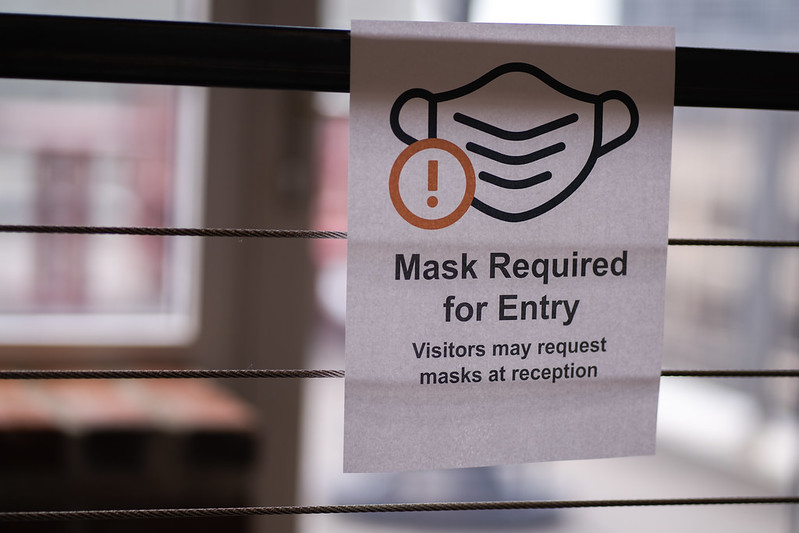
When mask mandates were recently lifted in Sonoma County, California, business owner Tracy Mattson “was excited to flip my mask off.”
That excitement was far less palpable among her employees and clientele at her bakery, COOKIE…take a bite!, she’d soon discover. “My staff is 100-percent vaccinated, and our county is 80-percent vaccinated, so I was surprised about the hesitancy of half my staff and many of our customers,” Mattson says.
To keep workers feeling safe, she opted to keep them masked up, while offering vaccinated customers the option of foregoing them. (Unvaccinated patrons must still wear theirs, she adds.) “It was important to respect the concerns of my staff that have stood by my business through this crazy time,” she adds.
Like Mattson, women entrepreneurs around the nation – and around the world – are grappling with how best to proceed with operations at this stage of the pandemic. And no one seems to have the same answer.
The recent surge in Covid-19 cases, caused by the virus’ more transmissible omicron variant, seems to be waning. And in light of this, both here and abroad, Covid-19 restrictions are easing. Numerous U.S. states have ditched indoor mask mandates in businesses, schools and more. The CDC itself may follow suit by amending its mask recommendations as early as this week. Countries like Italy and the United Kingdom are easing back their own federal-level safety measures. And this week, Australia reopened its borders to vaccinated tourists for the first time in almost 2 years.
But in other places, mandates remain in place. And the WHO is still advising folks to “make wearing a mask a normal part of being around other people.” This uneven, piecemeal approach to guidance and policy-setting makes it tough to know who’s right and what’s best, entrepreneurs note. Plus, there are varying levels of risk tolerance – and tolerance for risk mitigation – to contend with, from workers and customers alike.
So, do the masks stay on, even as mandates are rolled back? Should vaccination be required for patrons? For employees? Indeed, business owners now report finding themselves walking an especially precarious tightrope to simultaneously keep everyone safe and content. It remains to be seen if that’s possible.
‘It’s Truthfully Incredibly Exhausting’
Sameera Sullivan is the founder of dating service Sameera Sullivan Matchmakers, which has locations in New York City, Houston, Dallas and Portland. And she’s taken her cues on setting Covid-19 protocols in each of her branches from both scientific research and government regulations. As for her staff, “we’re all vaccinated and boostered.”
But while customers are told about the efforts her team is undertaking, and are “heavily encouraged” to mask up, plenty decline to do so, and she and her team must instead meet with them in areas where distancing is more easily achieved. “It’s truthfully incredibly exhausting arguing with those who do not share your point of view,” she says, explaining why she dropped mask requirements for clients. “I decided to spare myself and my employees from this daily hassle.”
Research backs Sullivan’s tendency toward masking. Since the beginning of the pandemic, masks have been touted as an effective way of stopping the spread. Studies show they can decrease the transmission of Covid-19 by at least 53 percent when worn properly. Vaccines have also, thus far, proven effective against Covid-19 – in terms of limiting infection by at least 76 percent, but even more so by keeping more serious symptoms and complications at bay.
But in addition to a lack of unified messaging around them, these measures have also been highly politicized from the start, largely splintering support for and compliance with them along ideological lines. Misinformation campaigns have further hindered successful use of mitigation strategies.
It’s an especially fraught matter because, even though the latest wave appears to have crested, Covid-19 continues to be a devastating disease. As of publication, there have been 78.6 million confirmed cases of Covid-19 in the United States, and 937,000 deaths. Globally, it’s 428 million cases, and 5.91 million deaths. And we’re still averaging roughly 7,000 deaths per day worldwide due to the virus.
Despite mandate rollbacks, experts – including Dr. Anthony Fauci, who serves as President Joe Biden’s chief medical advisor – caution against getting too relaxed, too soon. “There’s a lot of… pent-up fatigue on the people’s part about the restrictions,” he acknowledged in an interview. But, he added, “we got to be careful, because it is a bit risky to do something prematurely.”
Expert commentary such as this ultimately becomes part of the din of Covid discourse, prompting confusion, anger and exhaustion among, well, everyone. In short, it’s a mess. And that’s likely why Jenny Ly, founder of international travel company Gowanderly, feels as though she’s “stumbling in the dark, the same as the rest of the world.”
She requires masks for in-person meetings, and adopted a zero-tolerance vaccination policy for all employees – get the jab, or get a new job. Still, she struggles with mask noncompliance. “I have no idea about the number of emails that I have circulated among my team to take precautions and to always have masks on,” she says. “[Yet] even now, during some of our in-person meetings, I have to remind the same employees to wear masks every other time.”
No Set Answers, No Norms
Among women business owners, there’s no real consensus for how to handle the pandemic now. For example: A world away in Brisbane, Australia, the rules at Elice Max’s money-saving advice hub, EMUCoupon, are “pretty lax.”
“My employees have the option of working from home if they don’t feel comfortable in the workplace,” she notes. And vaccination is an absolute requirement for every member of her team. But while “there are still sanitizers everywhere and employees are asked to mask up … I am not that strict with the pandemic protocols nowadays.”
Simply put, she’s tired. “For me, it’s a matter of fatigue, as the whole 6-feet distance and constant hand-washing are wearing me out.” And she’s far from alone. Even in regions where most people take risk reduction efforts seriously, exhaustion over such measures has set in.
Over in Italy, Emily Cooper is also adopting a mix-and-match approach to implementing Covid protocols at her luxury menswear brand, Oliver Wicks. “Our company still follows a hybrid work model, and we still require employees who go to the office to wear masks and practice social distancing,” she says. But while vaccination is encouraged, “we do not force this upon anyone. At the end of the day, everyone is entitled to his or her own opinion.”
She describes it as staying safe but “learning to live with the virus at the same time.”
Yet there are populations that cannot quite relax – namely, parents of children under the age of 5, whose kids cannot yet be vaccinated, and the immunocompromised, for who are at greater risk of serious illness or death due to Covid-19. Also, relatively little is known about long Covid, which involves symptoms like fatigue and brain fog lingering for months after infection, and impacts an estimated 54 percent of Covid-19 patients – even those whose initial infections weren’t severe.
Ivory Coats of More Marketing Firm in Atlanta is viewing the situation as a person who goes home to two of those too-young-to-be-vaccinated children every night. “I don’t want to expose them to anything I may have encountered throughout my work day,” she says.
So at her firm, the masks are staying on, for the sake of her kids, and her staff. “We care about them and their household so it’s best to continue to proceed with preventative measures.” Because for Coats, normality – even the “new normal” that business owners, and all of us, are trying to establish – is not the endgame.
She adds, “I don’t believe there is a ‘normal’ anymore.”




